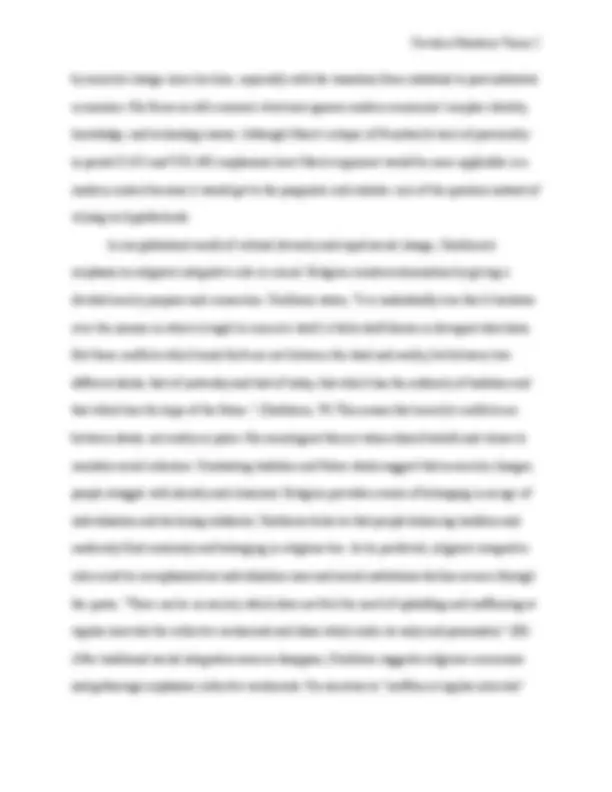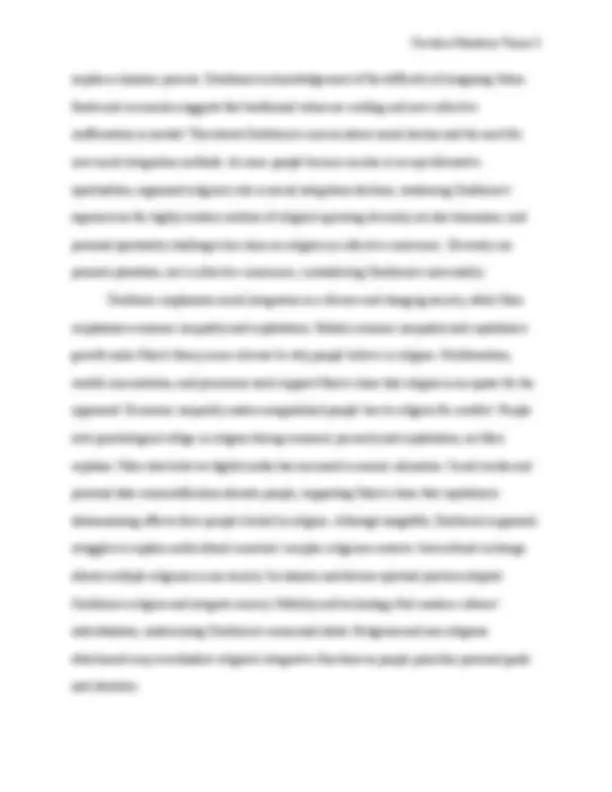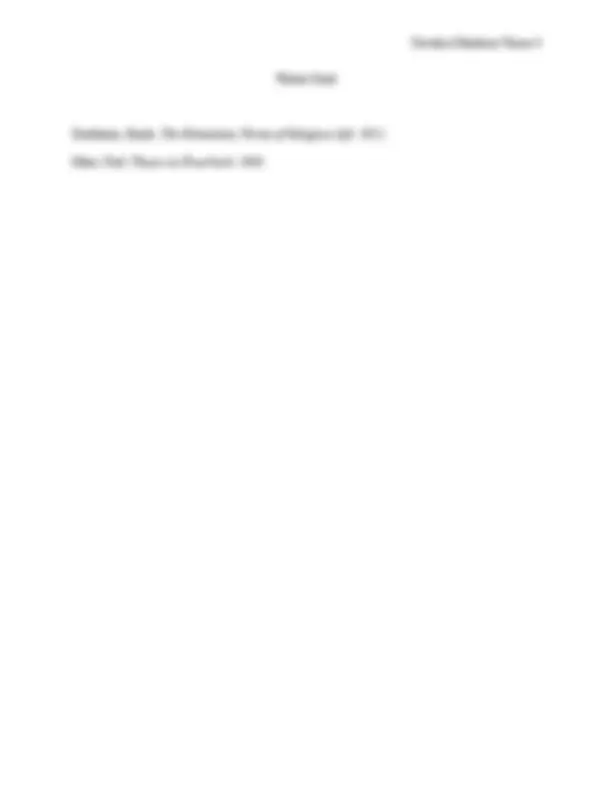





Study with the several resources on Docsity

Earn points by helping other students or get them with a premium plan


Prepare for your exams
Study with the several resources on Docsity

Earn points to download
Earn points by helping other students or get them with a premium plan
Community
Ask the community for help and clear up your study doubts
Discover the best universities in your country according to Docsity users
Free resources
Download our free guides on studying techniques, anxiety management strategies, and thesis advice from Docsity tutors
A comparative analysis of Marx and Durkheim's perspectives on religion's role in modern society. The author argues that Marx's focus on economic structures and labor alienation is more relevant today than Durkheim's emphasis on social integration. The essay explores how Marx's critique of religion as an 'opiate' resonates with growing inequality, while acknowledging the limitations of his theory. Conversely, the author highlights Durkheim's insights on religion's integrative function, but recognizes the challenges posed by individualism and secularism.
Typology: Essays (university)
1 / 5

This page cannot be seen from the preview
Don't miss anything!




University of Toronto Unveiling Contemporary Realities: A Persuasive Analysis of Marx and Durkheim on Religion Mariana Cavalca Monteiro Vieira SOC Professor J. Veugelers 27 November, 2023
Between Karl Marx’s argument in Theses on Feuerbach and Emile Durkheim’s theory in The Elementary Forms of Religious Life , who is more relevant in modern society when answering why people believe in religion? In this essay, I argue that Marx's focus on economic structures, such as labor alienation, makes his argument more relevant and applicable in modern society than Durkheim's focus on social integration. Marx's claim that religion opiates the masses during recessions rings true. Religion helps marginalized and oppressed people cope with global capitalism's huge economic disparities and psychologically escape exploitation and social injustices. According to Marx's first theses, "the chief defect of all previous materialism... is that things, reality, the sensible world, are conceived only in the form of objects of observation, but not as human sense activity, not as practical activity, not subjectively" (Marx, 67), understanding reality, especially in the modern day, requires recognizing human sense activity and practical engagement. Marx believes religion helps people make sense of their experiences and cope with hardships because religious beliefs and practices are responses to practical issues like economic exploitation and social injustices. Marx warns against viewing religion without considering lived experiences and material conditions. In religion, "revolutionary" and "practical-critical" activity means actively engaging with one's circumstances, questioning the status quo, and seeking change. This suggests that people may turn to religion for solace and to envision or participate in transformative practices that challenge societal injustices, which is relevant to the social justice wave of today and highlights how society is to blame for the alienation that turns people to religion. The digital age has exacerbated this concept. Through economic and social interactions, social media isolates people. Personal data commodification, gig economy precarity, and online interaction monetization support Marx's capitalist exploitation predictions. Marx's universality is challenged
implies a dynamic process. Durkheim's acknowledgement of the difficulty of imagining future feasts and ceremonies suggests that traditional values are eroding and new collective reaffirmation is needed. This shows Durkheim's concern about moral decline and the need for new social integration methods. As more people become secular or accept alternative spiritualities, organized religion's role in social integration declines, weakening Durkheim's argument as the highly modern realities of religion's growing diversity, secular humanism, and personal spirituality challenges his claim on religion as collective conscience. Diversity can promote pluralism, not a collective conscience, contradicting Durkheim's universality. Durkheim emphasizes social integration in a diverse and changing society, while Marx emphasizes economic inequality and exploitation. Global economic inequality and capitalism's growth make Marx's theory more relevant to why people believe in religion. Neoliberalism, wealth concentration, and precarious work support Marx's claim that religion is an opiate for the oppressed. Economic inequality makes marginalized people turn to religion for comfort. People seek psychological refuge in religion during economic precarity and exploitation, as Marx explains. Marx also believes digital media has increased economic alienation. Social media and personal data commodification alienate people, supporting Marx's claim that capitalism's dehumanizing effects drive people’s belief in religion. Although insightful, Durkheim's approach struggles to explain multicultural countries' complex religious contexts. Intercultural exchange allows multiple religions in one society. Secularism and diverse spiritual practices dispute Durkheim's religion and integrate society. Mobility and technology fuel modern cultures' individualism, undermining Durkheim's communal ideals. Religious and non-religious attachments may overshadow religion's integrative functions as people prioritize personal goals and identities.
Works Cited Durkheim, Emile. The Elementary Forms of Religious Life. 1912. Marx, Karl. Theses on Feuerbach. 1845.